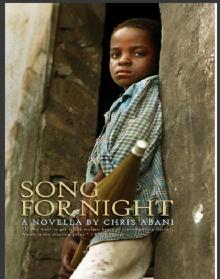Read Song for Night Storyline:
"Not since Jerzy Kosinski’s The Painted Bird or Agota Kristof’s Notebook Trilogy has there been such a harrowing novel about what it’s like to be a young person in a war. That Chris Abani is able to find humanity, mercy, and even, yes, forgiveness, amid such devastation is something of a miracle.”—Rebecca Brown, author of The End of Youth"The moment you enter these pages, you step into a beautiful and terrifying dream. You are in the hands of a master, a literary shaman. Abani casts his spell so completely—so devastatingly—you emerge cleansed, redeemed, and utterly haunted."—Brad Kessler, author of Birds in FallPart Inferno, part Paradise Lost, and part Sunjiata epic, Song for Night is the story of a West African boy soldier’s lyrical, terrifying, yet beautiful journey through the nightmare landscape of a brutal war in search of his lost platoon. The reader is led by the voiceless protagonist who, as part of a land mine-clearing platoon, had his vocal chords cut, a move to keep these children from screaming when blown up, and thereby distracting the other minesweepers. The book is written in a ghostly voice, with each chapter headed by a line of the unique sign language these children invented. This book is unlike anything else ever written about an African war.Chris Abani is a Nigerian poet and novelist and the author of The Virgin of Flames, Becoming Abigail (a New York Times Editor’s Choice), and GraceLand (a selection of the Today Show Book Club and winner of the 2005 PEN/Hemingway Prize and the Hurston/Wright Legacy Award). His other prizes include a PEN Freedom to Write Award, a Prince Claus Award, and a Lannan Literary Fellowship. He lives and teaches in California.From Publishers WeeklyStarred Review. In his latest novella, Abani renders the inner voice of mute 15-year-old My Luck, the boy leader of a platoon of mine sweepers in an unnamed war-torn African country. When he was 12, the then volunteer rebel had his vocal cords severed (the rest of his team received the same treatment), so that we wouldn't scare each other with our death screams. At the opening of the novella, My Luck awakens after an explosion to find that he has been separated from his unit. During his journey to find his platoon, he reflects on the events of his violent life. Abani is unafraid to evoke My Luck's dark side, and though My Luck's experience with killing is a singular joy that is perhaps rivaled only by an orgasm, his stock-taking also touches on guilt at witnessing his mother's murder, ambivalence about his imam father and tenderness for Ijeoma, a girl in his platoon killed by a mine. Initially, the present-tense narration is at odds with My Luck's inclination toward memory and reflection, but the story becomes more immersive and dreamlike (and, strangely, lucid) over the course of My Luck's quest. Abani finds in his narrator a seed of hope amid the bleak, nihilistic terrain. (Sept.) Copyright © Reed Business Information, a division of Reed Elsevier Inc. All rights reserved. From BooklistTrained as a human mine detector, an Igbo boy soldier in West Africa witnesses and takes part in unspeakable brutality. His clipped, dispassionate narrative tells of mutilation, rape, massacre. But tells is the wrong word. He has not spoken for three years since, at 12, his vocal cords were deliberately cut so that he would not scream and give away his platoon's presence if he was blown up. After an explosion, he travels back in search of his comrades through abandoned villages and rotting corpses—and through his own memories. As he did in Becoming Abigail (2006), Abani, who was himself jailed and tortured in Nigeria, never backs away from a gruesome detail, but the gore is never sensationalized. The horror of what happens to this Igbo boy is intensified by his confusion and his tenderness. He remembers his mother taught him to crochet; she died hiding him. Ijeoma, the girl he loved, comforted him after he was forced to rape a captive. Then Ijeoma stepped on a mine. His words, "I miss her," say it all. Rochman, HazelPages of Song for Night :
